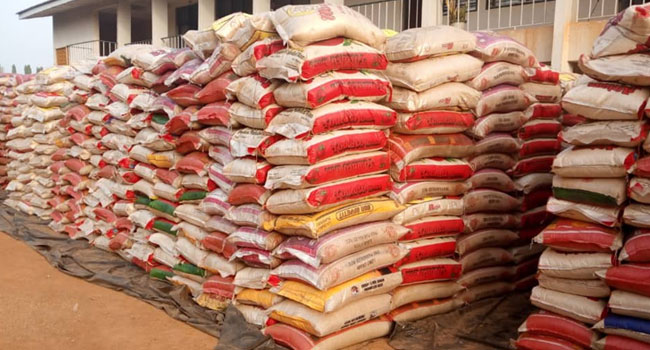Nigeria
Nigerian Government Launches 50kg Rice Sale at N40,000

To manage rising food costs, the Nigerian government has launched the sale of 50kg rice bags at N40,000 each.
Recently, the Federal Government made public their plan to set up centers all over Nigeria that will provide citizens with an opportunity to buy a 50kg bag of rice at N40,000.
The Minister of Information and National Orientation, Mohammed Idris, revealed this proposal after it was discussed in the Federal Executive Council meeting which President Bola Tinubu chaired.
Minister Idris stressed that the Tinubu government is taking steps to ease living conditions for Nigerians during difficult economic times, and this measure forms a part of those efforts. He stated his contention that the national protests slated for August 1 are superfluous since President Tinubu is already actively advocating on behalf of citizens.
To combat economic difficulties, the government’s efforts were detailed by the minister and included action such as providing 740 grain trucks among various states alongside subsidized rates for rice. These centers are located nationwide with each state being granted access to sell up to ten vehicles worth of rice at N40,000 per 50kg bag.
Idris mentioned that during the recent Council meeting, it was announced that 20 trucks were provided to each state governor for distribution to those in dire need – particularly the poorest individuals within society. Furthermore, rice is currently being sold at a reduced cost of approximately half its original price; this low-priced product has been transported to several locations throughout all states within Nigeria and can be purchased for N40,000 per bag.
Idris recognized that these interventions constitute just a starting point, and may not adequately address the requirements of all individuals. Yet, he confirmed that further endeavors are in progress primarily aimed at enhancing agricultural productivity and irrigation practices to curtail long-term food costs.
In addition to the student loan program, the minister discussed various government endeavors. One such initiative is distributing compressed natural gas (CNG) kits in order to alleviate transportation costs. While acknowledging logistical difficulties that have caused a delay in implementing CNG buses, he highlighted substantial advancements being made towards this goal.
The Minister of Interior, Olubunmi Tunji-Ojo, emphasized the successes of the administration that’s been in place for 13 months. He specifically mentioned how they’d eliminated fuel subsidies and implemented policies to encourage domestic trade in crude oil and refined products. His assertion was that these measures would result in increased investments, job opportunities, as well as strengthen Nigeria’s energy independence.
The expected outcome of unifying exchange rates is improved economic predictability, encouragement of foreign direct investment, and support for local government autonomy. These factors will eventually promote grassroots development as well.
After signing the minimum wage bill, Godswill Akpabio – President of the Senate – cautioned against disorder and encouraged Nigerian youth to resist political manipulation. He emphasized that damaging property would redirect necessary funds from development projects towards reconstruction efforts, an expense too great for Nigeria to bear.
To recap, the Nigerian government is presently taking steps to attenuate economic difficulties and better the standard of living for its population. The populace is urged to exercise endurance and collaboration during this transitional phase.
